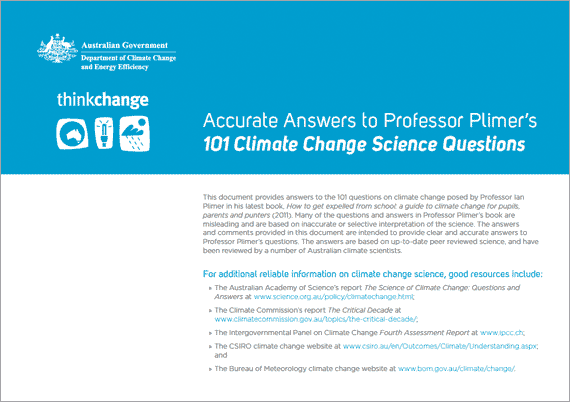101 responses to Ian Plimer's climate questions
Posted on 9 May 2012 by John Cook
The Australian Department of Climate Change and Energy Efficiency have put together a handy and recommended resource: Accurate Answers to Professor Plimer's 101 Climate Change Science Questions. This is in response to Plimer's book How To Get Expelled From School, a compilation of climate misinformation targeted at school children. One section of the book features 101 questions that he suggests children ask their teachers. The DCCEE summarise it well:
"Many of the questions and answers in Professor Plimer’s book are misleading and are based on inaccurate or selective interpretation of the science. The answers and comments provided in this document are intended to provide clear and accurate answers to Professor Plimer’s questions. The answers are based on up-to-date peer reviewed science, and have been reviewed by a number of Australian climate scientists."
As well as a direct response to Plimer's misleading questions, the document is an interesting and useful resource in its own right. As I explain in a workshop with the Climate Literacy & Energy Awareness Network (CLEAN), responding to misinformation can be educational opportunity, a chance to put myths in proper context and explain the science. So I recommend reading through the document which explains the science behind many common climate myths.
There are also numerous references to Skeptical Science graphs and resources, as we have already tackled many of the myths propounded by Plimer. In fact, SkS content has been appearing in a number of sources of late. Most notably, weather website Wunderground have published a section on climate myths, reproducing the SkS rebuttals of the top climate myths. Apparently they tweaked some of the text where they thought they could improve on our content (I haven't got around to checking where exactly, will be interesting to check).
SkS material is also being adopted in colleges and universities, with our rebuttals and graphs included in textbooks covering on topics such as geology, climate and psychology. The Debunking Handbook has been adopted into the curriculum of a philosophy course at Portland State University and a Science Communication course at the University of Western Australia. So kudos and credit must go to the SkS team who continue to produce content of high quality and quantity, that is not only being read on the SkS website but also being reproduced by scientists, communicators and educators across the globe.
Note: an alternative response to Plimer's 101 questions is provided by Ian Enting in the document Ian Plimer’s questions deconstructed. Analysis of ‘How to get expelled from school ..”































 Arguments
Arguments































[DB] This thread is about the Australian Governments 101 responses to Ian Plimer's climate questions and the scientific basis for them. It does not delve into the rationale for why Mr. Plimer takes the stance that he does. Nor does it explore the various and sundry conspiracy theories or "alternative explanations to known physics" that are based on little other than poorly-thought-out wishful thinking.
OHC is still increasing in its inexorable response to the radiative imbalance at the TOA. Use the Search function to look up Levitus 2012 from April for further info. The same for Ocean Acidification and modeling. All are off-topic on this thread.
Off-topic, conspiracy theorizing, allegations of fraud and ideological snipped.
Please construct further comments to comply with the Comments Policy as subsequent comments constructed as this one was will be summarily deleted. Thank you for your compliance and consideration in this matter.